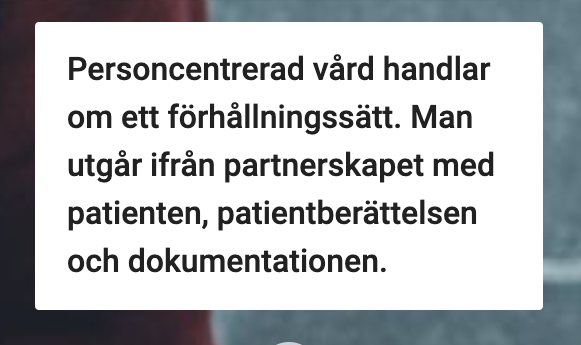Vi har nyligen (2021 02 12) inom CoSIE projektet reflekterat kring samskapande, dess vägar och förutsättningar inom lärande organisationer på ett nationellt interaktivt seminarium/rundabordssamtal. Detta tillsammans med deltagare verksamma främst inom vård och omsorg från svenska kommuner och Regioner samt några brukar- representanter och forskare. Syftet var att förutom erfarenhetsutbyte och inspiration erbjuda lärdomar och tankar för beslutsfattare. Många värdefulla idéer kom fram, frågan är hur kan politiken hjälpa till att befrämja värdeskapande tillsammans med medborgare som får insatser inom vård och omsorg? Nedan kan ni ta del av utdrag från rapport som går vidare till CoSIE projektledning och kommissionen och som tillsammans med andra 7 partners från Europa erfarenheter skall diskuteras den 15 April på ett gemensamt eftermiddag med CoSIE och Europeiska Sociala och Ekonomiska Kommittén.
What lessons have been learned from the co-creation experiences of these services?
| Lessons in shaping and co-creating innovative disability, social and health care services in Sweden: Diversify: Think of what data you use about the user/citizen to make your decisions. How well informed are they, what sources they build upon – those easiest available, how diversified or ‘true’/transparent? Include: Include public managers and diverse user groups in defining the needs. Question ethics: Be aware of digitally created and personally communicated user data and the ethical issues involved in service design and delivery by a ‘passive’ co-creation where the user might not even be aware of his data used for service delivery purposes. Use right words: Can people be steered towards co-creation? Laws may be important as guidelines but we have to be careful about the language and signals they are sending to the implementers. Is possibly user/citizen ‘participation’ and ‘influence’ a more scaring word for practitioners than co-creation? Should we not first secure that there is an understanding and abilities to achieve those goals so that service professional would not resist but be motivated for implementing this change? Right steering towards cultural change: We need to work for a cultural change – throughout all levels in the political system and in public sector organizations. This requires more than legal steering but also a change in steering approach and our ethical stance. Ethics based on curiosity, ability to see and hear the other as individual with needs and resources. Be aware: We need to be aware of the resistance among service professionals due to path dependencies and established practices in public sector that make their life easier rather than solely focusing on the user perspectives. Facilitate justice: Aiming for justice for all users easily leads to standardization of service practices that might prevent co-creation on individual terms. Could a solution be rather building in possibilities for co-creation in generic guidelines and concrete services practices? Change perspective: Public sector actors should realize that expectations today are approaching service delivery from a relational perspective, that services are not provided as goods (transaction from a to b) but their value and effect is co-created with user and other stakeholders and that different user perspectives are equally important as the perspectives of service professionals. Support: Leadership and steering logics allowing long-term qualitative goals in public services (alongside efficiency) is a key issue in advancing organizational culture towards co-creation. Leadership needs to be supportive in terms of relevant perspective, training and resources including time. Educate: there is a need to include relational and co-creative service perspective , and even the knowledge about user rights expressed legislation as well as the art of co-creating in the professional trainings. Power imbalances preventing co-creation exist both between user and professional and between different professions. Democratize knowledge: The citizens best and user best need not be seen as contradictory but complementary: Politics should be well informed to set the goals the what and administration/professionals in inclusive dialogues with users contribute with more precise knowledge of how, what is possible and with what effects. Offer resources: Users need to be politically allocated sufficient resources to be able to have access to forums and tools for co-creation! Inga and Magnus |


